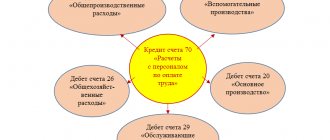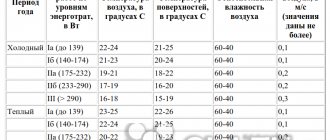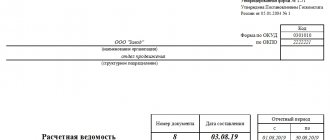Very often, an overpayment of salary to an employee can be caused by vacation, or more precisely, by its overexpenditure or advances that were not worked out.
The first option assumes that the person received vacation before the worked period - at the moment when the company employee wrote a letter of resignation, but the vacation money had already been issued, and the vacation time itself was not worked, thereby being converted into excess wages. The second option is based on the employee receiving an advance, after which the person quit without working out the accrued funds. Not every manager knows what to do if a dismissed employee is overpaid. There may be several ways out of this situation.
Why does overpayment occur?
The following are possible reasons for overpayment to a dismissed employee:
- Technical errors identified during a payroll audit:
- untimely reflection of information on time worked and various deviations from the regular schedule: sick leave, vacations, business trips, etc.;
- ignorance of payroll calculation methods or their incorrect application;
- distortion of the amount of mandatory payments both due to errors in the amount of the salary itself and due to incorrect accrual.
- Dismissal after receiving advance payment. If the share of the advance in the total salary is significant, and the employee quits immediately after receiving it, then an overpayment may also result.
- Vacation in advance. According to the Labor Code of the Russian Federation, an employee receives the right to vacation 6 months after starting work at a given enterprise. And by agreement with the manager, the employee can go on vacation earlier. If an employee takes a full vacation and then quits without working for a year, then part of the paid vacation pay is refundable.
The employee was overpaid
If you have any questions, you can consult for free via chat with a lawyer at the bottom of the screen or call by phone (consultation is free), we work around the clock.
Most often, excessive salary payments are caused by one of two reasons. The first is the so-called vacation overexpenditure, when the employee was given vacation for a period not yet worked. He received vacation pay and then quit, while the period for which the vacation was granted remained unworked. In this case, the amount of vacation pay becomes an excessively paid salary, that is, the employee’s debt to the employer. The second reason is an unpaid advance, when the employee received a certain amount in the middle of the month and then quit. Further, during the final calculation, it turned out that the salary actually earned in a given month was less than the advance received. Then the “unclosed” part of the advance will be listed on the debit of account 70, as the employee’s debt.
What are the dangers of making an incorrect calculation upon dismissal?
Mistakes made in any direction when making payments to employees are dangerous for the employer.
Understating payments to employees is, first of all, a violation of labor laws. Moreover, in such a situation, there is an underpayment of personal income tax and insurance premiums.
Overpayment, in addition to unnecessary expenses for the organization, also entails tax consequences. At the same time, income tax and other similar taxes (USN, Unified Agricultural Tax) are underestimated.
Consequently, in both cases, penalties and interest arise.
Lawsuit
The problem, when a dismissed employee was overpaid, how to write off and reimburse the money, concerns many managers of the company.
If the money issue cannot be resolved amicably, then the decision is made by the court, and the money is redirected from account 70 to account 73. If the cash return must be made by an employee of the enterprise, then it is necessary to work with paragraphs 51 and 50. But the opposite outcome of events involves the return of cash with the score numbered 73 to 70.
If the court decision is in favor of the person who worked at the enterprise, then the expenses of such a plan will be canceled in the tax report. If the company wins the case, then the amount must also be canceled in the accounting department.
If the employee wins, insurance premiums are considered legally paid, and the overpaid amount will not need to be returned. There is no need to edit reports.
As for personal income tax, if the company wins, the accounting decision is the same as in the voluntary return of cash by the employee, but if the decision is in favor of the employee, the tax can be considered withheld, and there is no need to adjust the documents.
How to recover overpaid wages after dismissal of an employee
The employer’s actions here largely depend on the position of the employee himself: whether he agrees to voluntarily return the overpayment or not. If the employee agrees, then the postings depend on what is being returned: advance payment or vacation pay.
The advance is usually not subject to personal income tax and insurance premiums, so there will be only one posting:
DT 50 (51) - KT 70
If we are talking about vacation pay, then by the time the employee is dismissed, they have naturally already been accrued and “imposed” on mandatory payments. All these entries for the refund amount must be reversed.
Example 1
The amount of excessively accrued vacation pay is 10,000 rubles. Then, with a voluntary return:
DT 50 (51) - KT 70 (8,700) with return
DT 20 (23, 25...) - CT 70 (-10,000) - vacation pay accrual reversed
DT 70 - KT 68.1 (-1300) - personal income tax reversed
DT 20 (23, 25.) - CT 69 (-3000) - insurance premiums reversed
If the employee does not cooperate, then the employer has to go to court.
In this case, the relationship with the former employee moves to a different level, so account 73, which relates to other calculations, is used.
Example 2
DT 73 - CT 70 (8,700) - claim for recovery of overpayment
If the court sides with the employer: DT 50 - CT 73 (8,700) - return by court decision
The amount of vacation pay, personal income tax and insurance contributions in this case are reversed similarly to example 1. If it was not possible to recover the overpayment, then its amount will have to be written off against other expenses:
DT 70 - CT 73 (8,700) - the court decided to refuse to collect
DT 20 (23, 25...) - CT 70 (-10,000) - the previously accrued amount is reversed
DT 91 - CT 70 (10,000) - overpayment amount written off
Personal income tax and insurance contributions, if the court sided with the employee, are considered paid legally and are not subject to adjustment.
When going to court, the employer must keep in mind that the prospects here depend on the reason for the overpayment. The return of “advance” vacation pay, although with restrictions, is expressly provided for in Art. 137 Labor Code of the Russian Federation.
But if there are errors in the calculation of the refund, there may already be problems. The same article 137 of the Labor Code of the Russian Federation gives the employer the right to return overpayments in case of accounting errors. But judges usually understand by them only arithmetic inaccuracies (Definition of the Supreme Court of the Russian Federation dated January 20, 2012 No. 59-B11-17).
Therefore, if the norms of labor or tax law were incorrectly applied, then the employer will most likely have to bear the extra costs.
Voluntary return
This often happens: an employee quits, and he is left with a debt.
Overpayment of vacation pay upon dismissal - not all company managers know what to do with taxes and administration documents. Presumably the former subordinate can return the money himself. If such an operation occurs with an advance payment, then additional insurance adjustments are not necessary, since contributions cannot be calculated from the advance payment. If the tax is withheld, then the money that is transferred can only be returned to the current account or accepted as a subsequent payment to the budget. If the tax period has expired, then an updated certificate is issued for the employee.
If the cash equivalent was returned to the company voluntarily by a person, then there is no need to make mutual settlements with the employee, since tax has already been withheld from this money.
The accountant, in turn, must reverse their accrual in the report for the tax office and cancel the expenses. In this case, the formation of an overpayment of insurance premiums should not be surprising. Adjustments to their accrual must be taken into account without fail in the current period in reports to the Social Insurance Fund; further payments will allow the resulting overpayment to be adjusted.
If a negative value is formed for an employee due to the withdrawal of vacation cash, then the services will not be able to accept such a report from the company. Consequently, it is the previous report that is subject to adjustment, and not the current one.
An updated certificate is created with the current report date, but the old number. The overpayment that has occurred can be returned to the company in several ways:
- To the company's current account.
- Take into account when calculating future payments to the state budget.
Example (writing off wages overpaid to a dismissed employee): an employee of a commercial enterprise Ivanov S.K. took a vacation for 2 weeks without working the required period. In this case, accrued vacation pay will be 10 thousand rubles, personal income tax (10 thousand rubles * 13%) is withheld and transferred to the state account. Citizen Ivanov receives 8,700 rubles (10 thousand rubles - 1,300 rubles).
Moreover, all reports have already been prepared by the accountant. Upon returning from vacation, the employee resigns. He returns the vacation pay to the company's cash desk.
The accountant needs to make other entries in which the employee's salary expense should be cancelled. After accepting the report, the tax inspectorate will make a decision to take into account 1,300 rubles in subsequent payments to the budget.
We find out the reason that resulted in the overpayment.
If there is an overpayment of wages, first of all it is necessary to find out the reason as a result of which it appeared. Why do you need to do this? The answer to this question follows from the norms given in Art. 137 Labor Code of the Russian Federation. By virtue of the provisions set forth in this article, deductions from an employee’s salary are made only in cases provided for by the Labor Code and other federal laws.
Deductions from an employee’s salary to pay off his debt to the employer can be made:
1) to reimburse an unpaid advance issued to an employee on account of his salary;
2) to repay an unspent and not returned timely advance payment issued to an employee in connection with a business trip or transfer to another job in another locality, as well as in other cases;
3) to return amounts overpaid to the employee due to accounting errors, as well as amounts overpaid to the employee, if the body for the consideration of individual labor disputes recognizes the employee’s guilt in failure to comply with labor standards or downtime;
4) upon dismissal of an employee before the end of the working year for which he has already received annual paid leave, for unworked vacation days[1].
What should be understood by a counting error? Labor legislation does not contain a definition of the concept of “counting error”. As the Supreme Arbitration Court indicated in Ruling No. 59-B11-17 dated January 20, 2012, based on the literal interpretation of the norms of the current labor legislation (Article 137 of the Labor Code of the Russian Federation), an error made in arithmetic operations (actions related to counting) should be considered counting. Thus, if an accountant, when calculating wages, incorrectly added up payments due to an employee, he made a counting error.
Please note that these are not counting errors:
In other words, if a computer program crashed, an accountant made a technical error, repeated erroneous payment of the same amount, or applied incorrect legal norms when calculating wages, resulting in an overpayment, such overpaid amounts cannot be withheld without the consent of the employee. These actions will be considered unlawful (see Appeal ruling of the Murmansk Regional Court dated July 22, 2015 No. 33-2153-2015).
Often, illegal deductions from wages are made upon dismissal. Let us recall that, by virtue of the provisions of Art. 137 of the Labor Code of the Russian Federation, deductions from an employee’s salary to pay off his debt to the employer may be made upon his dismissal before the end of the working year for which he has already received annual paid leave, for unworked vacation days. If the employer, when dismissing an employee, did not withhold payment amounts for unworked vacation days, then he does not have the right to recover these amounts from the former employee in court, except in cases of dishonesty in the actions of the named person or an accounting error. These decisions were made in the appeal rulings of the Khabarovsk Regional Court dated July 29, 2015 in case No. 33-4733/2015, and the Novosibirsk Regional Court dated February 9, 2016 in case No. 33-1022/2016.
Overpayment to a dismissed employee - what to do
The employer must notify the resigned employee of the fact of overpayment, who can return the excess amount received on a voluntary basis. If the former employee, in the presence of the circumstances listed in Part 4 of Art. 137 of the Labor Code of the Russian Federation, does not return the money, the organization has the right to go to court to recover the excessively issued amount as a result of a calculation error, is allowed (Article 137 of the Labor Code of the Russian Federation). The difficulty is that the legislation does not contain an interpretation of the concept of “counting error,” and in court you will have to provide evidence that the error was precisely a counting error and there was no dishonesty on the part of the employer or his accountant who calculated the payment. In addition, money provided as a means of subsistence cannot be returned. This includes unjustifiably paid wages and payments equivalent to them (pensions, benefits, scholarships, etc.), provided that their payment was not the result of a calculation error or dishonesty on the part of the recipient (for example, providing false information about work experience, the presence of dependents, certain benefits, etc.). For example, the judges of the Volga-Vyatka District did not support the company’s claim against a citizen to recover from the latter in favor of the organization illegally increased and received wages. At the same time, the servants of Themis indicated that Art. 137 of the Labor Code, and paragraph 3 of Art. 1109 of the Civil Code does not allow the recovery of overpaid wages from an employee (Resolutions of the Federal Antimonopoly Service of the Volga-Vyatka District dated 05.27.2011 in case No. A29-13535/2009 and dated 05.24.2011 in case No. A29-407/2010).
The employer may recover the overpaid amount from the chief accountant if he has full financial responsibility. For the deputy heads of the organization and the chief accountant, employment contracts may establish full financial liability (Part 2 of Article 243 of the Labor Code of the Russian Federation).
We comply with deadlines for reimbursement (withholding overpayments).
After establishing the reasons for the overpayment, it is necessary to remember the terms during which the overpaid amounts can be withheld from the employee.
By virtue of the provisions of Art. 137 of the Labor Code of the Russian Federation, the employer has the right to decide to deduct from the employee’s salary no later than one month from the end of the period established for repayment of incorrectly calculated payments, and provided that the employee does not dispute the grounds and amount of the deduction. As noted in the appeal rulings of the Moscow City Court dated 02.28.2013 No. 11-3853/2013, the Sverdlovsk Regional Court dated 05.22.2014 No. 33-7209/2014, if at least one of these conditions is not met, that is, the employee challenges the withholding or has expired month period, the employer loses the right to withhold these amounts and it can only be exercised in court.
If an employee was overpaid and quit
So is he submitting or has he already submitted? Did you receive the notice or not? But the essence of the proceedings is not at all clear in the sense that Russian legislation allows dismissal by agreement of the parties, i.e. without warning the employer of dismissal 2 weeks in advance. As a result, it turns out that your employer will spend more on legal costs to prove its point of view.
Therefore, it is unlikely that he will appeal to the courts; it is simply not logical. Based on the order, deduct the cost of damage from the employee’s income, not exceeding his average monthly salary. Taking into account this rule, it is necessary to recover damages both in cases where the employee bears limited financial liability, and in cases where financial liability arises for the full amount of damage. The employee must be familiarized with this order against signature and indicating the date of familiarization , with written confirmation of his consent to withhold the specified amount in the agreed monthly amounts (if the amount is large and it is not possible to withhold it within one month). Approaching the issue that has arisen not from the side of legal acts, but simply from a human perspective: everyone knows what amount is due to them.
An accountant is in charge of payroll, and he does not always have the opportunity to thoroughly check everyone before payment.
We reflect the amounts of overpayment in accounting.
Regardless of the reasons for the overpayment, it must be properly recorded in accounting.
In accordance with clause 80 of Instruction No. 162n[2], clause 102 of Instruction No. 174n[3], clause 105 of Instruction No. 183n[4], an employee’s debt arising from the recalculation of wages previously paid to him is reflected using the “red reversal” method the following account correspondence:
Account debit 0 302 11 000 “Payroll calculations”
Account credit 0 206 11 000 “Payroll calculations”
At the same time, operations to adjust previously accrued vacation pay (wages), personal income tax and insurance contributions are reflected using the “red reversal” method.
Claims for compensation for damage incurred in connection with overpayment of wages to a former employee (including overpayment to a former employee for unworked vacation days upon his dismissal before the end of the working year for which he had already received annual paid leave) are reflected in the entry (Letter of the Ministry of Finance RF dated 09.11.2016 No. 02-06-10/65506):
Account debit 0 209 30 560 “Increase in accounts receivable for cost compensation”
Account credit 0 206 11 660 “Reduction of accounts receivable for wages”
Please note that the entry given in the letter from the Ministry of Finance for transferring debt from account 0 206 11 000 “Calculations for wages” to account 0 209 30 000 “Calculations for compensation of costs” is introduced into instructions No. 162n, 174n, 183n by Order of the Ministry of Finance of the Russian Federation dated November 16. 2016 No. 209n[5].
Further, it should be noted: in their explanations in the above letter, Ministry of Finance officials note that the applied accounting methodology does not contain any restrictions on the codes of types of financial support (KVFO) (activities), within which calculations using account 0 209 30 000 can be reflected “Calculations for cost compensation.” Officials allow such transactions to be processed under KVFO 4 and 5.
Repayment of debt on overpayment of wages and vacation pay with the voluntary consent of the employee is carried out:
- or by depositing cash into the cash register or into the personal account of the institution;
- or through deduction from subsequent payrolls. Please note that the total amount of all deductions for each salary payment cannot exceed 20%, and in cases provided for by federal laws, 50% of the salary due to the employee (Article 138 of the Labor Code of the Russian Federation).
In accounting, debt repayment is reflected in the credit of account 0 209 30 000 “Calculations for compensation of costs.” In this case, standard entries are made, given in instructions No. 162n, 174n, 183n.
Amounts written off from the balance sheet in connection with the court declaring the guilty person insolvent are reflected in the credit of account 0 209 30 000 and the debit of account 0 401 10 173 “Extraordinary income from transactions with assets” while simultaneously reflecting the debt on the off-balance sheet account 04 “Debt of insolvent debtors” "
Let's look at an example of how to reflect this operation in accounting.
A budgetary institution overpaid wages to an employee. Due to a technical error, the accountant mistakenly transferred funds twice to the employee’s bank card. For November 2021, he was accrued a salary in the amount of 63,000 rubles, from which personal income tax was withheld in the amount of 8,190 rubles. However, instead of 54,810 rubles. 109,620 rubles were transferred to the card. Payment of wages was made through a subsidy allocated for the fulfillment of the state task
The employee, having discovered the overpayment, returned the excess to the institution's cash desk.
In accordance with Art. 1102 of the Civil Code of the Russian Federation, overpaid wages are recognized as unjust enrichment and must be returned by the employee to the institution. In the situation described in the question, there is no dishonesty on the part of the employee, therefore the employer cannot withhold the amount on his own initiative. In this case, in order to recover overpaid amounts, the employer is obliged to inform the employee in writing about the mechanism for the formation of overpaid amounts and the amount of their deduction (or repayment). In addition, in order to make deductions, the employee must agree with their amount. He confirms his consent in writing.
According to the conditions of the example, the amount of overpayment occurred due to a double transfer of the same amount of wages, therefore, personal income tax and insurance contributions are not adjusted.
WHAT AN EMPLOYER CAN DO
Regardless of what exact error occurred in the calculations when paying the employee the settlement upon dismissal, employers may react to this differently. Accordingly, take various actions to correct the situation. Or do nothing.
Option 1: Do nothing
Most employers adhere to this position, counting on the fact that the employee will not understand that he was not paid extra, will not dare to return to the former employer for clarification, will not dare to argue with him, and certainly will not dare to file a claim against the employer.
Of course, this is often what happens. The employee is indignant, but does not initiate a dispute if the amount of underpayment is not very large. However, if the amount of debt for the employee is significant, the likelihood of a dispute increases significantly.
In addition, in any case, the employer should not underestimate the following risks in this type of behavior:
1. A legal dispute may arise. If an employee goes to court and the fact of underpayment as a result of an incorrect calculation is established, when making a decision the court will demand (example 1):
• the amount of underpayment itself;
• interest for delay in payment of final payment upon dismissal;
• compensation for moral damage;
• all legal expenses incurred by the employee or collected by the court: representative services, postage, state duty (collected from the defendant employer), etc.
2. The employee can contact the State Tax Inspectorate. Even if the employee does not dare to openly argue with the employer in court, he still has the opportunity to complain about the offender to the regulatory body, that is, the State Labor Inspectorate.
Any inspection, as we know, can lead to the identification of not only those violations that the employee complained about, but also some others. For example, there may be violations in the timing of payment of wages to all employees, incorrect application of regional coefficients, etc. All this threatens with an order and administrative (and in some cases, criminal) liability.
Option 2. Pay the missing amount on your own initiative
The law does not prohibit this. However, the employer must take into account the following risks:
1. The employer still has financial liability. Issues of the employer's financial liability for delays in payment of wages and other payments due to the employee are regulated by Art. 236 Labor Code of the Russian Federation.
In accordance with this norm, if the employer violates the deadline for dismissal payments and (or) other payments due to the employee, the employer is obliged to pay them with interest (monetary compensation) in an amount not less than 1/150 of the Bank of Russia key rate in force at that time from not amounts paid on time for each day of delay starting from the next day after the due date for payment up to and including the day of actual settlement. In case of incomplete payment of wages and (or) other payments due to the employee on time, the amount of interest (monetary compensation) is calculated from the amounts actually not paid on time. The amount of monetary compensation paid to an employee may be increased by a collective agreement, local regulation or employment contract. The obligation to pay the specified monetary compensation arises regardless of the employer’s fault.
Thus, in addition to paying the missing amount, the employer must voluntarily accrue and pay the above monetary compensation (example 2).
Thus, an employer who made a mistake and decided to correct it on his own is obliged to pay the employee an additional amount in an increased amount - along with interest for the delay in payment.
2. Difficulties may arise with the payment procedure. Regardless of how quickly the employer identified errors in calculating amounts to an employee upon dismissal, the payment process may be complicated by the following:
• an employee may refuse to come to receive funds from the company's cash desk. Circumstances independent of the parties may arise that prevent this (for example, the employee has moved to another region);
• when transferring money to an employee’s card using details that were kept by the employer, it may turn out that the account is closed or, even worse, the bank no longer exists. That is, either the money will be returned, or it will be impossible to transfer it at all.
If, after dismissal, the employee stopped using the account (and card) to which the salary was transferred, but did not close it, the payment made by the employer will be considered proper, that is, this payment will terminate any obligations of the employer to the employee.
3. The employee has the right to demand compensation for moral damage. Of course, the percentage of those who take advantage of this right is small.
According to Art. 237 of the Labor Code of the Russian Federation, moral damage caused to an employee by unlawful actions or inaction of the employer is compensated to the employee in cash in amounts determined by agreement of the parties to the employment contract.
In the event of a dispute, the fact of causing moral damage to the employee and the amount of compensation for it are determined by the court, regardless of the property damage subject to compensation.
Despite the fact that the employer voluntarily reimbursed the amount underpaid as a result of an incorrect calculation upon dismissal, there was a violation of the employee’s rights. Accordingly, the fact of causing moral harm is obvious.
Another thing is that the courts award it in the minimum amount (usually 500–1000 rubles), taking advantage of the fact that the procedure for calculating compensation for moral damage has not been established.
Option 3. Enter into a dispute with the employee and insist on the correctness of the accrual
This course of action is chosen by at least half of employers who made errors in calculations during dismissal.
Basically, employers rely on the paucity of evidence from the employee and the wealth from the employer. In some cases, employers take liberties with the organization’s documents: they re-create time sheets, “lose” documents, challenge the competence of deputy directors to sign certain documents, etc.
In such situations, the likelihood of an employee losing in an unequal and unfair struggle with an unscrupulous employer increases in direct proportion to the degree of dishonesty of the employer.
Of course, there is a high risk that the court will identify false employer data. In this case, of course, the court will not force the employer to correct the timesheet or other document. He will simply treat it critically as evidence, without taking it into account when making a decision.
By adhering to this type of behavior, the employer, of course, will not incur more expenses and risks than with ordinary inaction and passively waiting for the court to make a decision to recover certain amounts in favor of the employee. Well, such employers obviously do not care about the deterioration of the organization’s status in society (including in front of future contractors).
Although for most counterparties who verify the future partner as a taxpayer and law-abiding business entity, his status as a defendant in the courts can undoubtedly have a negative impact on the decision to enter into civil relations with him and enter into transactions.
Option 4. Negotiate
This course of action is suitable for any situation. But most often it is used in cases where it is the employee, and not the employer, who is responsible. If the result of negotiations is positive, the employee voluntarily deposits the amount of the overpayment into the employer’s cash desk, and thus mutual settlements upon dismissal are finalized.
In general, you can come to a mutual agreement with an employee in any situation. Moreover, we recommend that you formalize this agreement in writing, recording what exactly the parties have reached agreement on (regarding the payment of what amounts, for example).
After performing certain actions (payment), the parties to the agreement will have no claims against each other. Accordingly, the risk of a legal dispute is practically reduced to zero.
However, it must be remembered that the terms of the agreement must not contradict the law. That is, for example, it cannot provide that “the employee refuses to receive compensation for delayed payment of wages,” but it can be established that “the employee does not require compensation for moral damage.” Unlike compensation for moral damage, the payment of which depends on the presentation of claims and the fact of violation of the employee’s rights, compensation for delayed payment is clearly established by law, which does not allow it to be excluded by contract.
Reasons for overpayment of wages upon dismissal and grounds for returning money
Please note that the overpayment is indeed refundable. However, this is not possible in all cases. The first thing you need to do is find out why the employee was credited with an “extra” amount of money. As a rule, this determines whether the subordinate should return it.
There can be two reasons for overpayment:
- A simple mistake was made when calculating wages. For example, the accountant mixed up the numbers or even added an extra zero;
- overpaid wages were accrued voluntarily in the absence of a calculation error. For example, an employee did not have the right to receive any substantial increase in salary, and due to the erroneous classification of his position as a citizen who is entitled to additional payment, he was awarded extra money.
It is worth noting that in the first case the person will have to return other people’s money. This is due to the fact that a counting error when calculating funds entails the obligation to return the amount in full. Excessive wages paid to a dismissed employee must also be returned without fail.
Debt forgiven by company
The simplest way out of this situation will be one where the company simply forgives the debt of the former employee.
For example, the reason for the debt was an unpaid advance; the debit balance will remain until the cash is written off.
If an employee owes money due to overspent vacation, then it is impossible to avoid reversing the posting of accrued vacation pay, thereby eliminating the amount in tax expenses. Until the debit is written off, the debit balance will also not change.
It’s not worth talking about the legality of insurance premiums paid from the employee’s vacation pay. Reporting and accounting are not adjusted.
In such a situation, the tax payment is legally withheld from vacation pay and must be transferred to the budget. There is also no need to correct documents. If the company did not withhold personal income tax from the advance payment that was not paid off by the subordinate, then after the debt is written off, the tax office must be notified of the impossibility of collecting the debt. The message is supported by a certificate.
The debt can be written off no later than three years. The accountant makes the following entries:
- Credit 70 debit 91
- The debt is written off according to the expiration of the statute of limitations.
It happens that after an employee leaves his place of work, underpayment is discovered. There may be several reasons for additional charges:
- An error in accrual that occurred earlier.
- Calculation of bonuses for the past period of work.
In the first case, the money is recalculated in favor of the employee, and insurance premiums are changed. All changes must be reflected in accounting and tax reports. The employee is notified of the recalculation, and the missing amount is paid to him.
If the company pays annual and quarterly bonuses to employees, then the missing payment to the employee can be included in the employee’s income for the year. Clarifications may be submitted to government organizations due to previously submitted reports.
>Overpaid wages: actions of the employee and the employer
How to return incorrectly transferred wages?
Even in a situation where the head of an enterprise or other organization has the right to recover overpaid salary from an employee, there are a number of serious restrictions. For example, this can only be done with the consent of the employee.
Agree with the employee to write off funds
So how can you write off wage arrears for a dismissed employee? There are situations when subordinates refuse to give their consent.
At the same time, article number 137 of the Labor Code does not indicate exactly how the employee’s consent should be formalized - in writing or orally. In order to avoid any problems or misunderstandings, consent should be recorded in writing.
It should be noted that the total amount of deductions by law should in no case exceed twenty percent. Consequently, the retention period extends over several months. Only by agreement of the parties is it possible to make compensation for damage by installments.
For example, a person undertakes to give not twenty, but ten percent every month. The employee must certainly sign an appropriate indemnity agreement indicating a specific time frame for the return of all funds.
Go to court to force collection of funds
If the employee does not intend to return the overpaid amount to the organization in which he works, then the management has the right to apply to the court with a corresponding application.
The statement of claim must be accompanied by copies and originals of the following documents:
- employment contract with a former employee;
- documents on calculation and payment of wages;
- error report;
- all kinds of notifications sent to a former subordinate with an offer to return the excessively accrued funds.
Can an employer recover overpayment from an accountant at fault?
The boss has the opportunity to hold accountable an accountant who made a serious error in calculations. In such a situation, there are two options:
- if the corresponding agreement on financial liability was previously signed with the accountant, then the entire amount of the overpayment is recovered from him;
- if an agreement on financial liability has not been drawn up, then damages are recovered from him within the limits of one average monthly salary.
According to current legislation, the head of an enterprise or company can demand a refund of the full amount not only voluntarily, but also in court. If it was not possible to return the money, then the damage caused is covered by the person (in this case the accountant) who made such a mistake. +7 , St. Petersburg +7
or via the feedback form below. Accountants often have to recalculate employee salaries after dismissal. In this case, a lot of questions arise: what entries to make, in what period to reflect adjustments to insurance premiums, whether it is necessary to submit an updated form 2-NDFL, etc. In this article we will tell you what an accountant should do both in case of overpayment and underpayment of salaries.
Report on detection of a counting error and notification of a dismissed employee
In order to record the legal fact of a counting error, it is recommended to draw up a commission act. Such a commission must include a chief accountant, as well as a payroll accountant.
The document indicates when, who and where the inaccuracy was identified. It is necessary to indicate the reason for its commission, as well as the exact amount of the salary. The paper is drawn up in two copies. It must be signed by all members of the commission.
One copy must be given to the former employee with notification of the need to return the excess wages received. The document requires you to indicate the exact amount and date by which the debt must be repaid.
How to reflect
Retention (refund) of overpayments should be considered as an independent fact of economic life in the form of accrual of income from compensation of costs.
As a general rule, income from compensation of costs of an institution is included in article 130 “Income from the provision of paid services (work), compensation of costs” of the analytical group of the subtype of budget income and sub-article 134 “Income from compensation of costs” of KOSGU (clause 12.1.3 of Procedure No. 85n, clause 9.3.4 clause 9 of Order No. 209n).
Operations for the accrual and receipt of income in the form of compensation for expenses are reflected in KFO 2, regardless of the source of financial support for the activity, from which the corresponding expenses (payments) were made (letter of the Ministry of Finance of Russia dated December 23, 2016 N 02-08-07/77797).
The accrual of income and receipt of funds from an employee should be reflected using account 2,209 34,000 “Calculations for income from compensation of costs” according to AnKVD 130 in conjunction with subarticle 134 of KOSGU (letter of the Ministry of Finance of Russia dated August 30, 2019 N 02-06-10/66912 ).
Postings (the employee returns the money to the institution’s cash desk):
1. D 0 209 34 567 K 0 401 10 134
— the employee’s debt to the institution is reflected;
2. D 0 201 34 510 (Increase in off-balance sheet account 17, AnKVD 130, KOSGU 134) K 0 209 34 667
— the receipt of funds from the employee to the institution’s cash desk is reflected;
3. D 0 210 03 561 (Increase in off-balance sheet account 17, AnKVI 510, KOSGU 510) K 0 201 34 610 (Increase in off-balance account 18, AnKVI 610, KOSGU 610)
— the withdrawal of funds from the institution’s cash desk for their subsequent deposit into the personal account is reflected;
4. D 201 11 510 (Increase in off-balance sheet account 17, AnKVI 510, KOSGU 510) K 0 210 03 661 (Increase in off-balance sheet account 18, AnKVI 610, KOSGU 610)
— the crediting of cash to the personal account is reflected.
When choosing between accounts 0 401 10 000 and 0 401 40 000, proceed from the following facts.
Account 0 401 10 000 is applied if the period for receipt of funds is determined, the amount of debt is determined finally and is not disputed by the opposing party. If the amount of expected income from compensation of costs is disputed, the amount of income cannot be reliably estimated, or this income relates to the following reporting periods, then income is accrued by debiting account 0 209 34 000 and crediting account 0 401 40 134.








